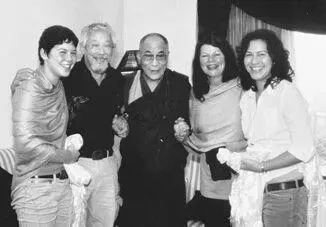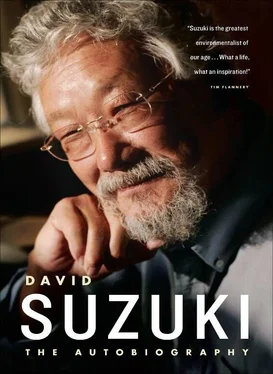While I'm on the subject of royalty, I have to say that although I'm not a monarchist, I think it's great to have a governor general representing the Crown (and lieutenant-governors in the provinces) to kiss babies, give out awards, cut ribbons, and otherwise perform an important role with the public. It gives our prime minister and premiers a welcome reprieve from these activities so that they can concentrate on the business of governing. The United States suffers because presidents have to perform both functions.
When the former CBC journalist Adrienne Clarkson was considering accepting the position of governor general, I ran into her partner, the Canadian writer-philosopher John Ralston Saul, and told him I thought he would be prevented from taking part in the important discussions he writes about. He assured me he had no intention of being muzzled, but I was skeptical. But just as he had said, once Adrienne was installed, he continued to speak out and write as he always had. My admiration for both of them increased as they added glamor to their roles and brought together Canadians to think about key matters. I was disgusted by petty criticism over the tax money spent as they went about their job, which I think they did well.
More than twenty years ago, Tara attended a function in Ottawa that featured Prince Philip, father of Prince Charles. She was chatting in a big meeting hall with Noreen Rudd, an expert in human genetics, when Prince Philip hove into view and asked what they did. When Noreen answered that she was a human geneticist interested in the effects of environmental factors on fetal development, the prince riposted, “My mother bumped into a record player when she was pregnant with me but it didn't do any harm, do any harm, do any harm.”
THE DALAI LAMA IS another man who deserves his celebrity status. In 2002 I received a letter from a leading Tibetan Buddhist from Dharamsala in northern India, the Dalai Lama's home in exile, asking me to talk about the environment to a select group of Tibetan monks living in India, in a program organized annually by their leader. I was flattered to receive the invitation, but I turned it down because it was for January, when I knew air pollution would be at its worst; I didn't want to risk further harming my lungs, which had been seriously weakened when I was in India filming the story on dams.
However, when my daughters learned I had declined the invitation, they were incredulous. “How can you turn down an invitation from the Dalai Lama?” they demanded. “It wasn't the Dalai Lama. It was someone high up among his monks,” I protested. Nevertheless, they begged me to reconsider because they wanted to meet the Dalai Lama. I knew he had an enormous following, including high-profile celebrities like the actors Richard Gere and Goldie Hawn, but I did not consider the Hollywood glitz and faddishness reasons to want to meet him. However, I loved the idea that the family might travel together and share time in India, so I wrote back and asked whether I could be reconsidered.
Fortunately, I was reinstated in the program and, in fact, a half-hour private session was arranged with His Holiness in New Delhi, the Indian capital. The girls were thrilled. We flew to Delhi several days before we were scheduled to meet him. On the way to our hotel from the airport, the cab stopped at a traffic light and we were besieged by children begging. One small girl came up to my window pointing to her empty sleeve — she had only one arm and held her one palm up. I pulled out my wallet and gave her a few rupees as she scampered away and the car moved on. At the next light, more children surrounded us, and one came over to my window, pointing out his empty sleeve. That's when I realized these children could find easy targets like me by hiding one arm inside their shirts. I was tickled by their ingenuity.
A meeting with the Dalai Lama was arranged in a grand hotel at 9:30 in the morning. We knew what a privilege it was. People often tried for years to get up close to him, and here we were being granted a half hour with only us. We arrived early, in a state of excitement, and were ushered into an area where we were told to wait. People were everywhere — guards, confidants, supplicants — but they were kept away from our waiting area. Many minutes passed, and we realized our scheduled time had come and gone. I began to wonder whether we would be told, “Sorry, but he has run out of time for you.”
Finally, forty-five minutes late, we were told to go down the hall to meet him. As we walked along the dimly lit corridor, the Dalai Lama himself suddenly popped out of a doorway, looked down the hall, and giggled, “I know you! I watch you on the Discovery Channel!” His is a world-recognized face, and he was acting as if I were the famous one.
We sat with him, and he talked warmly with almost a childlike openness and innocence. I had read a book about his early life and knew the ordeal of exile from his people. Yet here he was, so full of humor and mischief. We told him about our environmental interests and concerns, and he agreed with the thrust of our comments. We talked about how it seemed that money had become more important to people than other things. He reached over, took Tara's hand, and said, “Dogs and cats can do this,” as he pretended to lick and nuzzle her hand. “But money can't do that.” He was such a playful man, and his words were so direct and moving that at one point Severn began to weep. His Holiness didn't bat an eye or turn away embarrassed. He took Sev's hands into his, looked her straight in the eye, and kept on talking to her.
When he turned to environmental issues, we asked what he thought could be done. “Education,” he said, “has to be the answer.” I was a bit mischievous myself as I parried, “But we have an American president who graduated from Yale, one of the best universities in the U.S.” “That's not the kind of education I'm talking about,” he replied, and I felt silly for having been a smart-ass.
I knew he was getting all kinds of signals from his handlers that he was running late, but he never gave any indication he was under pressure or in a hurry, and he spent three-quarters of an hour with us. Finally, he stood to indicate our time was up. We had been instructed to give him white scarves, which we did, and he in turn placed them around each of our necks. He called over one of his people and urged him to take pictures with our cameras as he seized our arms and grinned away. “Take another one,” he kept saying so that we would be sure to get one good picture. He was incredibly generous with his time and left us with an indelible souvenir of our meeting.

The family meeting the Dalai Lama in New Delhi
The Dalai Lama apparently has long had an interest in science and believes his monks should not focus just on matters spiritual. For a number of years, he has invited scientists to speak to a group of monks selected from across India. Thus, in January 2003, I was one of four scientists volunteering our time to teach those monks. One lecturer was a nuclear physicist from Georgia Tech in Atlanta, another a chemist from Long Island, and a third an evolutionary biologist from Harvard, while I was there to speak about genetics as well as the environment.
In January in the foothills of the Himalayas, it is quite crisp at night. We were put up in a hotel with stone walls and tile floors, which were unbelievably cold. There was no hot water in our room. At best we might get enough lukewarm water to just cover the bottom of the tub, so bathing was a pretty quick activity. In the morning, we would walk for a mile or so across fields to a village for orphaned Tibetan children, where the monks were staying. Actually, many were not truly orphans but had been sent out of Tibet by parents who remained in the Chinese-held nation.
Читать дальше



![David Jagusson - Devot & Anal [Hardcore BDSM]](/books/485905/david-jagusson-devot-anal-hardcore-bdsm-thumb.webp)









